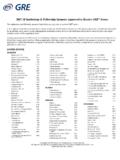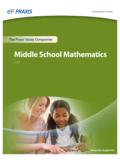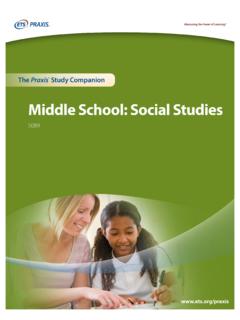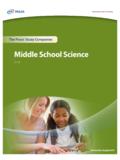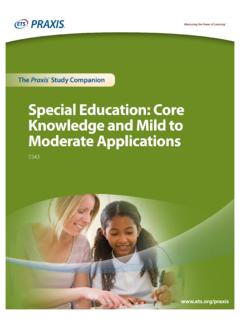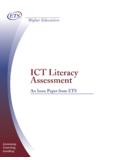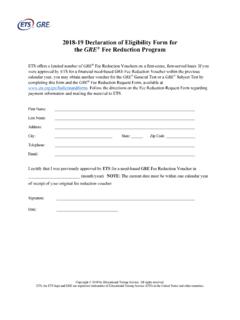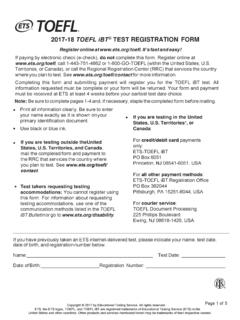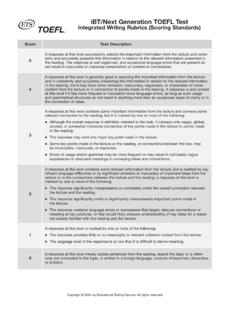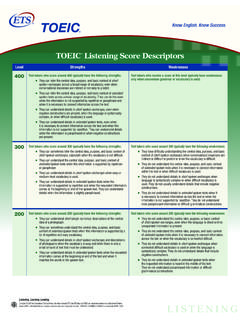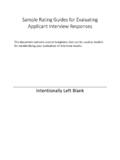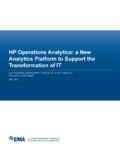Transcription of General Information and Study Tips - ETS Home
1 General Information and Study tips PRAXIS II: SUBJECT ASSESSMENTSThe ETS Higher Education Division is committed to supporting learning and advancing teaching through a coherent approach to the licensing, advanced certifi cation, and professional development of teachers and school 2005 by Educational Testing Service. All rights reserved. EDUCATIONAL TESTING SERVICE, ETS, and the ETS logo are registered trademarks of Educational Testing PRAXIS SERIES is a trademark of Educational Testing Information & Study TipsTable of ContentsIntroducing The Praxis Series Assessments .. 3 What Are The Praxis II: Subject Assessments? .. 3 What Is Licensure/Certifi cation? .. 3 Why Does My State Require The Praxis Series Assessments? .. 3 What Kinds Of Tests Are The Praxis II: Subject Assessments?.
2 3 What Do The Tests Measure? .. 4 How Were These Tests Developed? .. 4 How Are The Praxis II: Subject Assessments Different From Other Tests I Have Taken? .. 5 How Should I Prepare To Take These Tests? .. 5 Preparing For Multiple-Choice Tests .. 6 How To Prepare For Multiple-Choice Tests .. 6 Why The Multiple-Choice Tests Take Time .. 8Be Familiar With Multiple-Choice Question Types .. 8 Understanding Multiple-Choice Questions .. 13 Understanding The Details Of The Question .. 17 Understanding Questions Containing NOT, LEAST, EXCEPT .. 18 Preparing For Constructed-Response Tests .. 22 What Are Constructed-Response Tests? .. 22 How To Prepare For Constructed-Response Tests .. 22 Understanding Constructed-Response Questions .. 23 Other Information ..28If You Have A Disability Or If English Is Not Your Primary Language.
3 28 Taking The Test .. 28A Summary .. 28 Are You Ready? Checklist .. 29 Study Plan .. 30 Copyright 2005 by Educational Testing Service. All rights reserved. EDUCATIONAL TESTING SERVICE, ETS, and the ETS logo are registered trademarks of Educational Testing PRAXIS SERIES is a trademark of Educational Testing Information & Study TipsIntroducing The Praxis Series AssessmentsWhat Are The Praxis II: Subject Assessments?The Praxis Series Subject Assessments are designed by Educational Testing Service (ETS) to assess your knowledge of specifi c subject areas. They are a part of the licensing procedure in many states. The Subject Assessments test your knowledge of the actual content you will be expected to teach once you are licensed. Your state has adopted The Praxis Series tests because it wants to confi rm that you have achieved a specifi ed level of mastery in your subject area before it grants you a license to teach in a Praxis Series tests are part of a national testing program, meaning that the tests covered in this Study guide are required in more than one state for licensure.
4 The advantage of a national program is that if you want to move to another state, you can transfer your scores from one state to another. However, each state has specifi c test requirements and passing scores. To determine the test(s) you need to take, refer to the State Requirements section of the Praxis Web site ( ).What Is Licensure/Certifi cation?Licensure in any area medicine, law, architecture, accounting, cosmetology is an assurance to the public that the person holding the license possesses suffi cient knowledge and skills to perform important occupational activities safely and effectively. In the case of teacher licensing, a license tells the public that the individual has met pre-defi ned competency standards for beginning teaching practice. Because a license makes such a serious claim about its holder, licensure tests are usually quite demanding.
5 In some fi elds, licensure tests have more than one part and last for more than one day. Candidates for licensure in all fi elds plan intensive Study as part of their professional preparation: some join Study groups, others Study alone. But preparing to take a licensure test is, in all cases, a professional activity. Because it assesses the entire body of knowledge for the fi eld you are entering, preparing for a licensure exam takes planning, discipline, and sustained effort. Why Does My State Require The Praxis Series Assessments?Your state chose The Praxis Series Assessments because the tests assess the breadth and depth of content called the domain that your state wants its teachers to possess before they begin to teach. The level of content knowledge, refl ected in the passing score, is based on recommendations of panels of teachers and teacher educators in each subject area.
6 The state licensing agency and, in some states, the state legislature ratify the passing scores that have been recommended by panels of teachers. What Kinds Of Tests Are The Praxis II: Subject Assessments?Two kinds of tests comprise the Praxis II: Subject Assessments: multiple-choice (for which you select your answer from a list of choices), and constructed-response (for which you write a response of your own). Multiple-choice tests can survey a wider domain because they can ask more questions in a limited period of time. Constructed-response tests have far fewer questions, but the questions require you to demonstrate the depth of your knowledge in that area. The two kinds of tests require different preparation, so they will be discussed 2005 by Educational Testing Service. All rights reserved.
7 EDUCATIONAL TESTING SERVICE, ETS, and the ETS logo are registered trademarks of Educational Testing PRAXIS SERIES is a trademark of Educational Testing Information & Study TipsWhat Do The Tests Measure?The Praxis Series Subject Assessments are tests of content knowledge. They measure your understanding and skills in a particular subject area. Multiple-choice tests measure a broad range of knowledge across your content area. Constructed-response tests measure your ability to provide in-depth explanations of a few essential topics in a given subject area. Content-specifi c pedagogy tests, most of which are constructed-response, measure your understanding of how to teach certain fundamental concepts in a subject area. The tests do not measure your actual teaching ability, however. They measure your knowledge of a subject and of how to teach it.
8 The teachers in your fi eld who help us design and write these tests, and the states that require them, do so in the belief that knowledge of your subject area is the fi rst requirement for licensing. Teaching combines many complex skills, only some of which can be measured by a single test. While the tests covered in this Study guide measure content knowledge, your teaching ability is a skill that is typically measured in other ways; for example, through observation, videotaped practice, or portfolios. How Were These Tests Developed?ETS began the development of The Praxis Series Subject Assessments with a survey. For each subject, teachers around the country in various teaching situations were asked to judge which knowledge and skills a beginning teacher in that subject needs to possess. Professors in schools of education who prepare teachers were asked the same questions.
9 These responses were ranked in order of importance and sent out to hundreds of teachers for review. All of the responses to these surveys (called job analysis surveys ) were analyzed to summarize the judgments of these professionals. From their consensus, we developed guidelines, or specifi cations, for the multiple-choice and constructed-response tests. Each subject area had a committee of practicing teachers and teacher educators who wrote the specifi cations, which were reviewed and eventually approved by teachers. From the test specifi cations, groups of teachers and professional test developers created test questions that met content requirements and satisfi ed the ETS Standards for Quality and Fairness.**When your state adopted The Praxis Series Subject Assessments, local panels of practicing teachers and teacher educators in each subject area met to examine the tests and to evaluate each question for its relevance to beginning teachers in your state.
10 This is called a validity Study because local practicing teachers validate that the test content is relevant to the job. For the test to be adopted in your state, teachers in your state must judge that it is valid. During the validity Study , the panel also provides a passing-score recommendation. This process includes a rigorous review to determine how many of the test questions a beginning teacher in that state would be able to answer correctly. Your state s licensing agency then reviewed the panel s recommendations and made a fi nal determination of the passing-score the development process, practitioners in the teaching fi eld teachers and teacher educators participated in defi ning what The Praxis Series Subject Assessments would cover, which test would be used for licensure in your subject area, and what score would be needed to achieve licensure.
